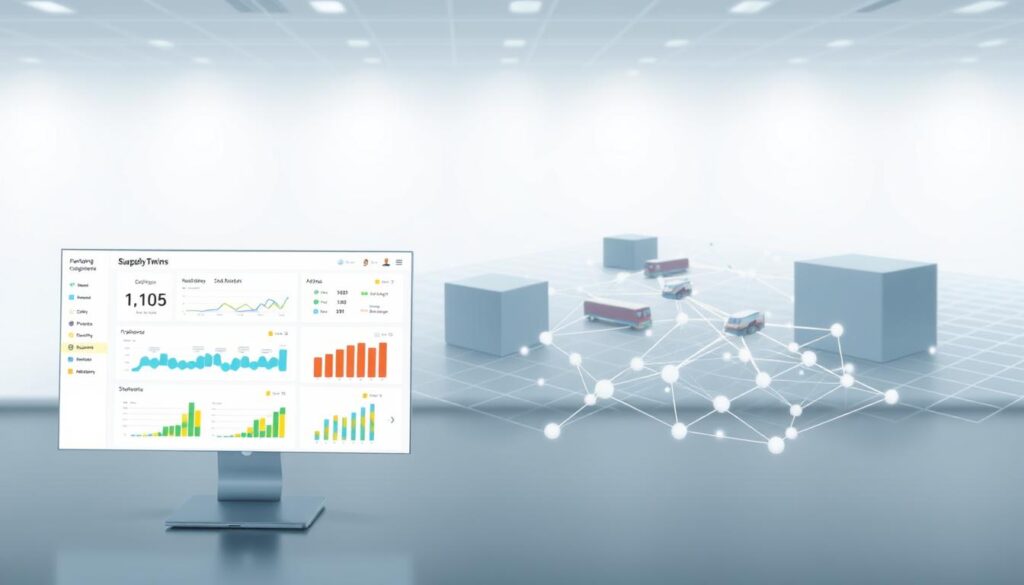Companies using digital twin tech can cut costs by 15-30%. This is thanks to digital twin supply chain optimization. It makes supply chains run smoother, saving money and time.
The idea of digital twins started in the 1960s. But the term “digital twin” became popular in 2010. Now, digital twin tech is a big deal in supply chain management. It’s expected to grow to $26 billion by 2025.
Supply chain digital twins help with planning and cutting costs. A survey shows 60% of supply chain pros think digital twins make better decisions. We’ll look into how digital twins can make supply chains better.
Key Takeaways
- Digital twin technology can help organizations save operational costs by 15-30%
- Digital twin supply chain optimization can improve logistics planning accuracy by 25%
- Supply chain digital twin can reduce inventory costs by approximately 20%
- Digital twin technology in supply chain management can facilitate a 30% reduction in transportation costs
- 60% of supply chain professionals believe that digital twin technology enhances decision-making in logistics
- The global digital twin market is projected to reach $26 billion by 2025
Understanding Digital Twin Supply Chain Optimization
Supply chain optimization is key for businesses to stay ahead. Digital twin technology helps a lot. It uses supply chain optimization software to create a virtual supply chain. This lets companies test and improve their operations.
The benefits of digital twin in supply chain are many. They include better efficiency, lower costs, and happier customers. Digital twins let companies watch their supply chain live. They can spot problems early and make smart choices.
Some big pluses of digital twins in supply chain management are:
- Improved forecasting and predictive analytics
- Enhanced visibility and traceability
- Increased operational efficiency and reduced costs
- Better decision-making and risk management
Using digital twin tech opens doors for growth and innovation. As digital twins get better, businesses must keep up. They should look into how this tech can help their supply chain.
| Benefits | Description |
|---|---|
| Improved Forecasting | Predictive analytics and real-time monitoring |
| Enhanced Visibility | End-to-end visibility and traceability |
| Increased Efficiency | Optimized operations and reduced costs |
Common Supply Chain Challenges Solved by Digital Twins
Supply chain management gets better with digital twins. They offer real-time monitoring and predictive analytics. This helps solve problems like visibility, transparency, and predictability.
Using digital twins in supply chain management has many benefits. For example:
- DHL cut transportation costs by 25% with digital twins in logistics.
- Siemens saw a 20% drop in unexpected downtime with digital twin technology for predictive maintenance.
- Unilever reduced energy use by 15% with digital twins in manufacturing.
Real-time visibility from digital twins helps spot bottlenecks and areas for betterment. This lets companies act fast to avoid risks and boost performance. It can make delivery times better, operations more efficient, and customers happier.

Companies like Pfizer and Boeing have seen digital twin benefits in their supply chains. With the right tools, organizations can cut costs, improve performance, and keep inventory levels just right.
| Company | Benefit | Result |
|---|---|---|
| DHL | Reduced transportation expenses | 25% reduction |
| Siemens | Decreased unexpected downtime | 20% decrease |
| Unilever | Reduced energy use | 15% reduction |
Implementing Digital Twin Technology in Supply Chain Operations
McKinsey says digital twins work well in supply chains with a good plan. First, find out where digital twins can help most. This is key for success.
Using digital twins makes supply chains better. They help predict and improve operations. Real-time data from IoT devices gives insights for smart choices. Digital twins make supply chains more efficient.
Assessment and Planning Phase
This step is about checking the supply chain and seeing where digital twins can help. It’s important to think about how digital twins will change things. This way, companies can plan well and make the change smoothly.
Data Integration Requirements
It’s important to bring together data from many places, like sensors and IoT devices. This data makes a virtual model that shows what’s real. With this data, companies can make better choices.
By using a clear plan and digital twins, companies can make their supply chains better. Digital twins are a big step towards a more flexible and quick supply chain.
Real-World Case Study: Manufacturing Company X’s Digital Transformation
DHL and Procter & Gamble used digital twins to improve their supply chains. They saw big wins in efficiency, cost cuts, and better visibility. Manufacturing Company X, a top maker of goods, followed their lead.
They created a digital twin supply chain optimization to make their work smoother. This let them try out different scenarios and find problems. It helped them make smart choices based on data, cutting down on mistakes.
Here are some big wins from using digital twin supply chain optimization:
- Improved operational efficiency
- Reduced costs
- Enhanced visibility
- Real-time monitoring of transport, inventory, and demand
- Forecasting capabilities for proactive decision-making
With supply chain digital twin tech, Manufacturing Company X changed its game. They saw big boosts in efficiency, cost savings, and better visibility. Their story shows how digital twin supply chain optimization can change the game for companies.
Measuring the Impact: Key Performance Indicators
To see how well digital twins work in supply chains, we need to watch certain numbers. These numbers show if things run better, cost less, and are safer. By looking at these numbers, companies can see what digital twins do well and what they can get better at.
Using digital twins can cut down on unexpected stops, making the whole chain work better. They help us catch problems right away, which means less waste. Some big pluses of using digital twins in supply chains are:
- Things run better
- Costs go down because of smarter supply chain steps
- It’s safer because we can spot problems before they happen
- We can see what’s going on in the supply chain more clearly
The global market for supply chain digital twins is growing fast. It’s expected to grow by 12% each year from 2024 to 2033. By 2033, it’s going to be worth $7.8 billion. Using digital twins helps companies make their supply chains better, cheaper, and more efficient.
With digital twins, companies can find and fix problems before they cause trouble. They can use data from digital twins to make smart choices. This leads to better supply chain management, lower costs, and happier customers. Companies that use digital twins see big improvements in their supply chains.
| Benefits of Digital Twin | Description |
|---|---|
| Operational Efficiency | Things run better because we can watch them closely and predict problems |
| Cost Reduction | Costs go down because we make the supply chain smarter and waste less |
| Risk Management | It’s safer because we can spot problems before they cause trouble |
Best Practices for Digital Twin Integration
Organizations need to follow best practices for digital twin in supply chain. McKinsey says it’s important to plan, integrate data, and set up tech. This helps improve supply chain operations and performance.
Predictive maintenance is key in digital twin. It can cut downtime and repair costs by 20-30% in some fields. Digital twins also speed up product design and development by 50%. In manufacturing, they can boost production efficiency by 10-20% by finding and fixing bottlenecks.
Benefits of digital twin in supply chain include:
- Improved predictive maintenance
- Reduced time-to-market
- Increased production efficiency
- Enhanced decision-making capabilities
Supply chain management gets better with digital twins. They create a digital copy of the supply chain for real-time monitoring and simulation. This leads to better efficiency, performance, and cost savings. A study shows 70% of companies see better decision-making with digital twins.
In conclusion, digital twin in supply chain makes a big difference. By following best practices and using supply chain solutions, companies can improve their operations.
| Industry | Benefits of Digital Twin Implementation |
|---|---|
| Manufacturing | 10-20% increase in production efficiency |
| Automotive | Improved vehicle reliability and performance |
| Healthcare | 25% increase in preventive care effectiveness |
Conclusion: Transforming Supply Chains Through Digital Innovation
Supply chain management is changing fast. Digital twins are a key technology for better operations and a competitive edge. Over 80% of supply chain leaders will keep investing in digital twins.
These leaders see the value in improving efficiency, cutting costs, and managing risks. digital twin supply chain optimization uses real-time data and predictive analytics. This helps companies find problems quickly and make smart choices.
It makes inventory management better, improves transportation planning, and helps with predictive maintenance. This leads to big savings and better operations.
As more companies use supply chain digital twin solutions, they’ll be ready for supply chain challenges. They’ll be able to optimize supply chain processes for success. The future of supply chain management is all about digital twins. They help companies stay quick, strong, and ready for change.





